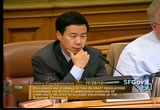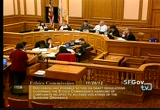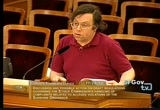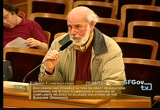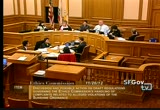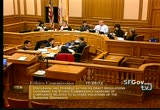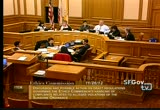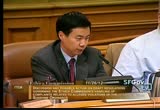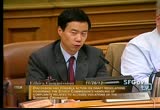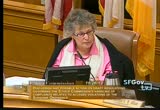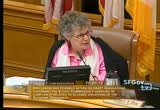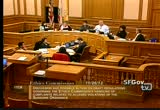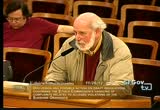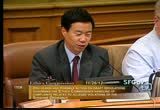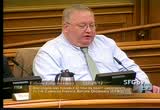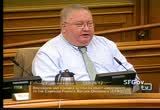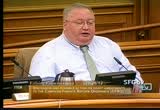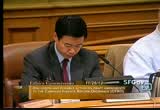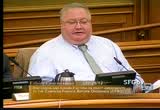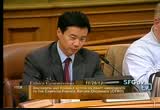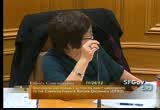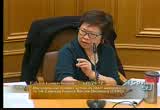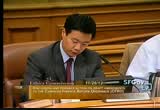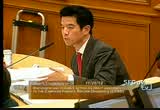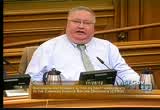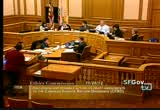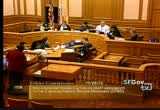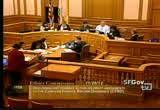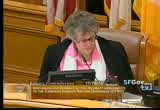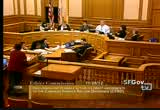tv [untitled] December 3, 2012 7:30pm-8:00pm PST
7:30 pm
commissioners need to attend. >> i think it would be fair to add to both. >> okay. if that is the case, can it just be added to section 4 rather than being added to both 2 and 3? >> we can do that. >> okay. any objections from the commissioners on that? do we need a revote and take public comment on it again? >> yes. >> let's take public comment on it? mr. pillpa? >> i think where we're going with this is on chapter 4ie2 the commissioner or chp may rescheduled the hearing for good cause and might read "may continue or reschedule a hearing at their discretion for good cause," good cause may include absence of one or more commissioners. >> i think that is a little too discretionary for what
7:31 pm
we're talking about. >> okay. >> anyway, it could possibly go there. >> somewhere in that range. i think on the chapter 2 question, i would probably not change the burden. i think the standard of proof and burden to be kind of makes sense. that is what the whole basis of the chapter 2 versus 3 thing was. i think i would be better with three positive votes needed to make a finding that there was a violation. so even if it requires three votes to find a violation, you can still hold the person to the burden, if they didn't meet their burden, then you go the other way. although it does play out in the same ways that we have talked about. i also would not substitute -- there was a suggestion at one
7:32 pm
point to substitute the finding of task force for the commission in the event that the commission doesn't overturn the tank ask force. i think the task force and the commission stand separately and i would not subject that you take the task force recommendation on its own. you can choose to, but i don't think there should be a regthat provides in the absence of a commission decision to the contrary. i think there are really different powers and duties and i wouldn't want to complete those. i think i have said enough for the moment. thanks. >> respectfully i disagreeing with member pillpa with respect
7:33 pm
to burden of proof, with respect to chapter 2. the fact that the matter has been referred from the task force means that the task force has found a violation. perhaps a willful one. and i think that the burden of proof should definitely rest with the resplendent in that case. as a matter of fact, i think that if you recall, when the task force refers we're not looking for re-adjudication. again, we have five new members and it's possible that consensus would change. but when this matter has come before you, before us, with the task force previously constituted, the consensus and a very strong consensus of the task force has been we're not
7:34 pm
sending matters to you for readjudication. we're sending them for enforcement of our orders of determination. >> i agree. the point of this was to provide some deference to the task force decision and i for one am comfortable with the possibility on a 2-2 vote a task force find would be upheld, if the commission felt that -- the [tpha-ebz/] were [pr-erpbt/] felt that was propriety. if they felt like they wanted a full five-member commission to decide it, they can so find and continue the hearing. but i'm comfortable with the arrangement we have just discussed. any objections from the commissioners? so we would add a sentence perhaps to section 1
7:35 pm
e2 that the commission or commission chair shall reschedule the hearing if at least four members cannot attend. i'm sure there is a better way to say that, but that idea be included therein? >> let me read something for you. the only concern when using the language," shall," if the fifth commissioner for some reason cannot be present, but feel that they want to participate, seems to me you should have discretion. if that commissioner would say if you could schedule it when
7:36 pm
i'm there. >> i'm sorry, i meant to suggest that they shall continue it there aren't at least four there, but leave in sentence about rescheduling for good cause, which would be. but if you have better language, i'm all ears. i just made it up on the spot. >> i just want to leave some discretion in the chair as to whether or not it those schedule it if there are four going to be present. >> that is important. do we need actual precis language to revote on? >> can i read this? >> at any time a hearing is placed on the generated four or more commissioners must be in attendance. otherwise the hearing must be continued to the next meeting.
7:37 pm
excuse me, the hearing shall be continued to the next meeting. >> that is just addition to what is already there? >> correct, i'm not taking anything out. >> does that sound reasonable? >> yes. >> is there a motion to amend our finding with respect to chapter 4 to reflect the sentence read into the record by mr. st. croix? >> so moved. >> second. >> all in favor? >> ea. >> opposed? hearing none, let's move on to decision point 8.
7:38 pm
i am certainly sensitive, mr. knee, to your concern that there are new task force members. however, i think for me at least, given how long this process has phon gone and the great detail of input we have gotten from you and other members of task force, i do think we need to move forward here. certainly we're not closed to improvements to these regulation as we go forward and close this. any other comments with respect to decision point 8? >> i agree with chair hur and the fact that we can take insights from the task force
7:39 pm
and it's new membership, and improve this or improve it in light of our experience is telling. it has been a long time. and it's tempting to say what is another month or two? but the challenge of even getting us together or the task force together for additional meetings has proven so cumbersome, although i'm usually a great optimist, i'm not optimistic we could do it that quickly and then time would move on. i also am remembering the encouragement that we have received at a number of meetings to actually be able to bring forward some of these matters. and for me, that weighs heavily in the balance as well, to be able to actually move them, and pay them the respect that they
7:40 pm
deserve and bring them to our docket at our meetings. i wonder if we do something that would, for example, in addition to whatever the task force decides to do to convey their thoughts to us and something that we could do to at a six-month point to ask for comments on this or after a certain number of hearings, to make sure that we explicitly invite their observations on the rule as as they are being applied or some other fashion to acknowledge that we are open to their thoughts? maybe a year is a better time given that we want to have some experience with this. >> mr. st. croix, any thoughts on this? >> everything that we do is always a work in progress and
7:41 pm
i'm sure after we conduct some of the hearings under this procedure and not after, but during, we'll get feedback on them. so we'll pay close attention to how they go and always we intend good outcomes and hope we get them. we'll see how everything constructively works and then go from there. >> comments from the commissioners on ? i think that is reasonable and maybe the commission staff can put on the list we should revisit this in a year or so and seek comment not just from the task force, but other interested entities in how this is playing out? public comments on agenda item 8? decision point 8? >> just a quick question. what you are actually voting on here is the regulations as they
7:42 pm
appear in attachment a, is that correct? >> no. >> just the decision points drafted on november 16th? >> these are the decision points that we have just been discussing? >> okay. >> just wanted to clarify that. again, i absolutely understand your position this has been a long, drawn-out process and i applaud the patience you have exhibited in listening to the tax task force and listening to members of public and we move forward from here. >> thank you for saying that. is there a motion to adopt decision point 8, the san francisco sunshine ordinance regulations as amended by the commission at this meeting? >> so moved.
7:43 pm
>> second. >> all in favor? >> aye. >> opposed? hearing none, it passes. and once again, a great deal of thanks to the public, the task force, and a great deal of thanks to the staff for handling this. it's been a difficult process. i know firsthand how much work you all have put into it. you can tell how long it's been when your constantly having to remind us what we had talked about and decided at previous meetings, which i am sure is frustrating for you, but appreciated by us. so thank you for your hard work. the next item on the agenda is discussion and possible action regarding amendments to cfro. first let me check with the
7:44 pm
commissioners, are we okay going forward? does anybody need a short break? >> fine. >> fine. >> mr. st. croix would you like to introduce this agenda item? >> so during the summer days of the mayoral campaign, the most recent mayoral campaign, we had issues that presented themselves to us that were new to san francisco in that there were campaign -- let me take that word back. there were committees organized to draft ed lee to run for mayor. he was at the time considered to be a caretaker who was to fill the vacancy until the next election could be held. there were at least three sump committees, i think maybe four
7:45 pm
and some of them raised good sums of money. and my concern was that they were functioning as campaigns without actually being campaigns. the commission decided that they weren't campaigns under current law. but i think the commission agreed that the raising and spending of that size of money was not designed by the voters to be something that went unregulated. so the commission directed the staff to put together some provisions that would, as i said, regulate committed are designed to draft, particularly those that raise tangible sums of money. the reason for that is that a citywide campaign aimed at a
7:46 pm
single person still reaches people citywide, and would conceivably impact their decisions at the polling place based on the fact that you get someone to run for office by extolling their virtues. so these rectally simple to follow will treat under our law, such campaigns, such committees, excuse me, as primarily formed campaigns and therefore, report their activities to the voters.
7:47 pm
>> they are divided into two diction points. does the commissioners have any questions with regards to decision point 1? i have a question and it has to do with our definition of "support." i have some concern that it's maybe a little too restrictive, because i could imagine someone simply spending money to advocate that someone be elected without "encouraging or urging them to declare." i mean certainly in the run ed run instance there was that case they were trying to encourage him to declare. what if it had just been elect ed
7:48 pm
lee for mayor? would that fall within this definition? >> i would say it would. because if you have identified ed, if ed is not a candidate. >> right. >> and someone makes an effort, expenditure or other method to support that person when they are not a candidate, it should -- i think the average layman would say that is an inducement to run. >> why are we setting ourselves up for that ambiguity? why do we need to define "support?" >> if i may, i don't know that we necessarily need to define "support," but the definition of the draft committee really is a committee that spends or raises funds of $1,000 or more.
7:49 pm
so if it is just somebody who urges someone to run without raising funds, no money is involved. >> right. >> that would not be a committee. >> right. agreed. but what if they are not "encouraging them to run?" i mean we're still trying to capture anyone who is spending money to support the election of someone who is not a declared candidate, regardless of whether they are saying hey, mr. thompson, we really want you to declares a candidate. versus saying vote for mr. thompson. he would be the best mayor for san francisco. >> so what you are saying, if i understand it, vote for mr. thompson, he will be the best person for san francisco? that is really getting him on the ballot? or getting him nominated or getting him certified for nomination where
7:50 pm
he has not taken action to become a candidate? >> right. we want that draft committee to be covered by this. >> right. i think as the executive director says, this law will cover that situation. >> okay. >> where you have an individual who has not declared as a candidate, who has not given permission for anybody to raise funds or spend monies on his or her behalf, who has not given permission to be on the ballot. this will cover those committees that raise funds or spend money or raise at least $1,000 to encourage that person to be the next mayor or the next member of the board of supervisors. >> i have got to say, i don't what ambiguity is being created
7:51 pm
by the definition of "support." because your example would seem to clearly be a case where someone was encouraging someone to run. >> but why? i mean if i just say vote for ed lee for mayor >> but you can't vote for him? >> sure you could, you could write him in. >> to be a write-in candidate and the city attorney can correct me, to be a write-in candidate, i think you have to have an approval prior to do that, right? >> yes effectively to take office at some point you will have to declare as a candidate. so even if someone starts digging in yard signs saying bob thompson for mayor, and for bob thompson to actually appear on the ballot and be elected at some point, mr. thompson would need to declare. while that is not necessarily
7:52 pm
spelled out on the yard sign. >> this is not actually if they can achieve the elected os. we're aiming at people who are spending money in support of a candidate, in september of someone who is not a candidate for elected office and we want to close that loophole. i don't see the advantage of lipting it to people who are encouraging or urging -- i mean why not just leave a1 as-is. i mean, i have another slight amendment to it. what are we worried about that required us to define what "support" means? >> i think that is a fair point. he think what you are generally saying is that if we define "support," or possibly excluding things in the definition. i think that is a very fair point. i would also just point out subsection 4 does allow the ethics commission to propose regulations and i think the reason that we put that in there, we know that to the
7:53 pm
extent there is any potential ambiguity or loophole, people will try to go there. that is just how things go. >> this whole issue came up because of a loophole, because someone found a leap hole. >> right. so i think to some extent the ethics commission has the ability to address leap hole lope holes. the only downside if we don't define "support" at all there will be the chance of zero gay and lesbian as of what "support means." >> if we had "support" i would define it as public action or statement or actions
7:54 pm
encouraging or urging -- i will concede that i'm hoping that my hypothetic is ridiculous and it would be interpreted in the way that we have all think it should be. >> you just built them their loophole. >> i was thinking that election makes it more restrictive. >> that was my reaction when you said that. >> the big problem we had last time, the committees kept saying we are not a campaign. we don't have a candidate. we can't be a campaign without a candidate.
7:55 pm
and the commission accepted that. but at the same time, they were raising money and spending money that had the effect of a campaign while not being regulated. >> could we solve it by having both in the definition? the one here and the one commissioner hur suggested? >> i wouldn't have a problem with that. >> in the sense that there are two holes in the dike and we need to plug them. [ laughter ] >> okay. my other comment on decision point 1 was do we want to limit it to public support? or is that too narrow? >> what provision are you looking at? >> i'm looking at a 1, shall
7:56 pm
mean my person, group of persons or entity that either receives contributions of $1,000 or more or makes expenditures of $1,000 in order to publicly support the election? >> you mean take the word "public" out of 2? the definition of "support?" >> i guess that would be redundant. >> i think there is some merit in thinking about taking the word "public" out of the definition of "support." because why would we allow people to take private -- spend money on private actions encouraging someone to run without reporting that? >> we don't want to be in the business of determining whether the expenditure from such an entity took place in a living
7:57 pm
7:58 pm
prohibition on support, that would -- i'm thinking outloud here -- that would be going too far because anybody can say to somebody else, i think you would make a good mayor, i hope you run. what makes it acceptable, is that it's the transfer of money behind that speech that allows us to get involved. does that sound, as i say it outloud, does it sound plausible? no. 2 doesn't stand alone as a prohibition. it's the formation of a committee to do this. and you could have a committee, if it had no money. the five of us got together and had a conversation with somebody, totally independent of our commissioner roles and no money changed hands that is also okay. i'm just sort of kicking the
7:59 pm
tires. >> that wouldn't stop friends of taking them out for dinner and saying here are the reasons to run. so we're not capturing that activity. >> what if it's a really nice dinner? >> and they got contributions from others towards? >> then we want to know. >> then we want to know about that. >> and the public wants to know about that. >> is that a public action? >> no. i don't think so. >> right. it would fall under a draft committee. that would be a draft committee. >> it just wouldn't support, -- publication support a candidate essentially? >> i think once you start collecting contributions, as a public action. so if they are at this private dinner and you start collecting contributions for a run at an elective office, i think it's a public action. or it co t
91 Views
IN COLLECTIONS
SFGTV: San Francisco Government Television Television Archive
Television Archive  Television Archive News Search Service
Television Archive News Search Service 
Uploaded by TV Archive on

 Live Music Archive
Live Music Archive Librivox Free Audio
Librivox Free Audio Metropolitan Museum
Metropolitan Museum Cleveland Museum of Art
Cleveland Museum of Art Internet Arcade
Internet Arcade Console Living Room
Console Living Room Books to Borrow
Books to Borrow Open Library
Open Library TV News
TV News Understanding 9/11
Understanding 9/11